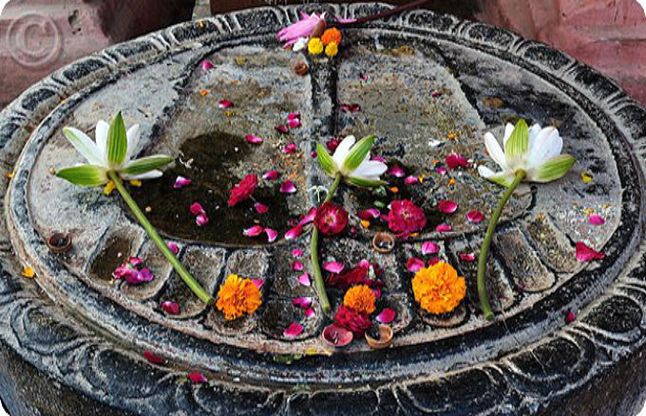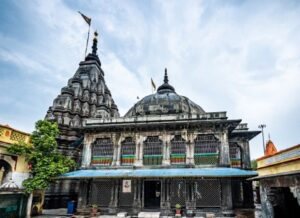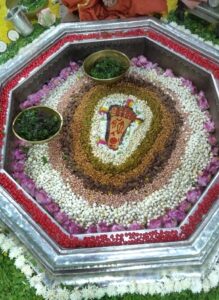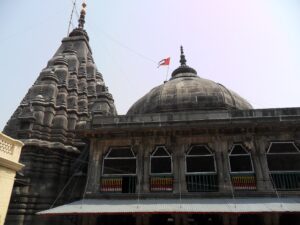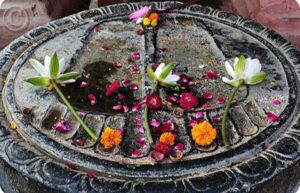Vishnupad Mandir Gaya:
In Gaya, Bihar, India, on the banks of the Phalgu River, there is a historic Hindu temple called Vishnupad Mandir that is devoted to Lord Vishnu. The temple is thought to have been constructed on the spot where Vishnu allegedly killed the demon Gayasura or imprisoned him. The Vishnupad Temple has a 40-cm footprint that was allegedly left by Lord Vishnu when he trod on Gayasura’s breast to subdue him. The footprint is inscribed into a slab of basalt known as Dharmasila.
Also Read:
In Gaya Vishnupad temple serves as the focal point for Shraddha rituals. The temple’s long-standing priests are the Brahma Kalpit Brahmins, also referred to as Gayawal Brahmins, Gayawal Tirth Purohit, or Pandas of Gaya.This shrine has been visited by the illustrious saints Madhvacharya, Chaitanya Mahaprabhu, and Vallabhacharya.
Vishnupad Mandir History:
Although the temple’s building date is unknown, it is thought that Rama and Sita visited the location. On the banks of the Falgu River, Devi Ahilya Bai Holkar, the ruler of Indore, rebuilt the current building in 1787. Ahilyabai Holkar, who had built the temple, had her officers scour the area for the best stone for the temple, and they ultimately determined that Jaynagar’s munger black stone was the best option. The officers discovered another mountain close to Bathani (a tiny village in the Gaya district), where they could easily carve and deliver the stone to Gaya because there was no adequate route and the mountains were quite far from Gaya.
The artisans were brought by the officers from Rajasthan. In the Bihar village of Patharkatti, which is also a popular tourist destination, they began carving the temple. The last temple was built in Gaya, not far from the Vishnupad temple. Many craftsmen left the temple after it was finished being built, but some of them chose to remain in the Pattharkatti hamlet itself. This location has been designated by the Bihar government as one of the state’s top tourism attractions. A view of Gaya city and the popular Vishnupad temple may be had from the summit of the Brahmajuni hill, which is southwest of the Vishnupad mandir. Near this temple, there are numerous smaller temples.
Architecture of Vishnupad Temple:
It is thought that Lord Vishnu’s footprints were placed in the centre of the temple when it was constructed. This footprint symbolises the moment when Lord Vishnu defeated Gayasur by putting his foot on his chest, according to Hinduism. The 40 cm long footprint of Lord Vishnu is etched in solid granite inside the Vishnupad Mandir and is encircled by a silver-plated basin. This temple supports the pavilion on 8 rows of exquisitely carved pillars, giving it a height of 30 metres. Large grey granite blocks joined together with iron clamps form the temple’s structure.
The eastward facing octagonal shrine. It has a 100-foot-tall pyramidal tower. The tower contains portions that are alternately simple and have indentation sides. A succession of peaks connected at the top are created by angling the sections.The Akshayavat, an everlasting banyan tree inside the temple, is the location of the funeral rites.A gold flag, weighing around 51 kg, is perched atop the temple. A hexagonal railing with a silver finish inside the temple is called a “pahal” and is called a “Garv Ghiri.”
Vishnupad Mandir Timings:
The timings of vishnupad mandir is 6.30 am – 7.30 pm
Vishnupad Mandir Location:
Chand Chaura, Gaya, Bihar 823001
Visit:
How to reach Vishnupad Temple Gaya?
Rail: The Vishnupad Temple is three kilometres south of the railway station.
By air: The trip to Vishnupad Temple via a cab or taxi takes about 17 minutes. Vishnupad Temple is 7 kilometres from the closest airport. Vishnupad Temple is about 135 kilometres from Patna Airport.
By Road: This temple has excellent road access to a number of locations, including Gaya, Nalanda, Rajgir, Patna, Varanasi, and Calcutta.
Places to Visit Near Vishnupad Mandir:
Mahabodhi Temple
The Great Buddha Statue
Bodhgaya Bodhi Tree
The Royal Bhutanese Monastery
Maa Mangla Gauri Mandir
Vishnupad Mandir photos:

